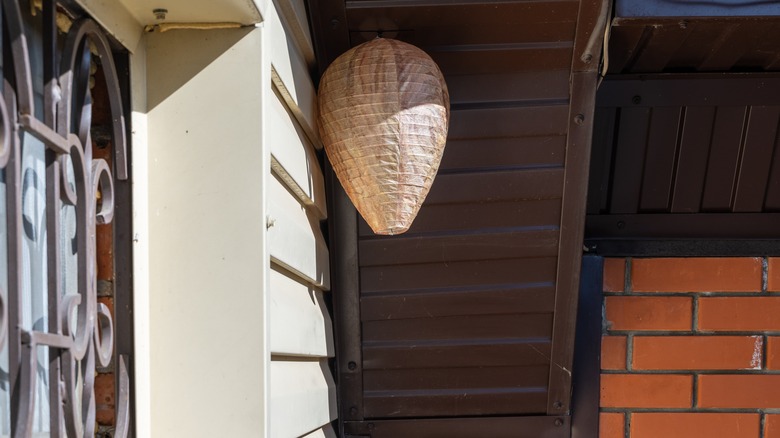YouTube
If wasps like making themselves at home near your home, you might find yourself seeking out easy, safe, pesticide-free wasp deterrents. One idea that may sound appealing: a paper bag. However, while some people swear by it, this method hasn’t been proven to work regularly.
To try this tactic, you take a small paper bag and fill it with something (such as other bags or wadded-up newspaper). Basically, you want to shape it so it looks similar to a wasp nest. Then, use a piece of string to tie the false nest near where wasps visit your home or yard. The idea is that wasps don’t want to move in with competition nearby. When they see what they think is another wasp nest, they’ll find a different place to set up shop.
While anecdotal evidence suggests this method works for some people, there’s no consensus on whether it’s a reliable deterrent. There are many different kinds of wasps with different behaviors and home environments, so what works for one place or species may not work for others. Also, wasps may leave a place for various reasons. Without scientific research, there’s no way to know if a false nest was really what drove them away: it could simply be a coincidence.
Are false nests worth a try?

Because it’s inexpensive and easy, the paper bag hack might be worth a try, but it’s not a guaranteed wasp deterrent. Another risk is that wasps could actually use the paper bag as building material, adding fuel to the wasp-nest fire.
While researching wasp removal, you may notice that there are also store-bought false nests available. They’re intended to work in the same way: by convincing wasps that there’s competition near your home, enticing them to move elsewhere. The false nests certainly look more realistic than a paper bag. Still, they may not work either unless the wasps near you build that same kind of nest and are particularly non-competitive.
One issue is that wasps rely on smell, not just sight. The false nest won’t smell real, so they likely won’t recognize it as a deterrent. The lack of actual wasps in the nest is another giveaway. In fact, wasps might even move into a false nest and use it as a home.
As it turns out, wasps aren’t so easy to trick! Since this deterrent isn’t proven, you may not want to spend the money to buy a false nest. Trying it won’t do any significant harm (and it could work on certain species), but you might have better luck with other approaches.
Other natural wasp deterrents
Even though wasps are considered pests, they’re also pollinators and play an important role in many ecosystems. They also hunt other pesky species, such as flies.
If wasps build a nest on your property but out of your way, it’s actually best to leave it there, so you can reap the benefits of having wasps nearby without getting stung. However, if they’re encroaching on your space, there are other, more effective deterrents to try.
Some of the best wasp deterrents rely on the insects’ sense of smell. Vinegar appears to be very effective against wasps: you can spray it on areas you want to keep wasp-free. Just don’t spray it on an actual nest — you’re almost sure to get stung.
You can also use your garden to repel wasps. Basil is not only delicious but a natural wasp repellent. Other kinds of plants can attract wasps, so removing them from your garden can help solve the problem. Some wasp-attracting culprits include Queen Anne’s lace, sedum, and fruit trees.
By deterring wasps rather than killing them, you’ll support healthy plants and ecosystems in your area. While a false nest might not do the trick for you, it can be an option in your arsenal. With a variety of tactics to try, you’ll soon be able to tell those pesky wasps goodbye.